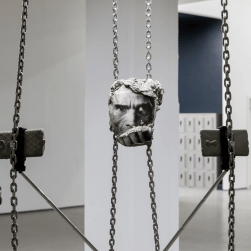
Sprovieri presents Provisional Heritage, the second solo show in the UK by the young, award winning Brazilian artist, Matheus Rocha Pitta, at the new gallery space: 23 Heddon Street.
Provisional Heritage is a result of the artist’s incursion into an abandoned warehouse in East London a couple of weeks before its demolition. By collecting the materials and the objects found in the warehouse, Matheus Rocha Pitta explored the process of ‘sculptural actions’ with a video and photographic registers not only of a pile of tyres covering an abandoned car, but also of the empty spaces these tyres leave behind, signalled by indexical imprints. The ‘sculptural actions’ thus involves material displacements that, in this case, become visual events in themselves.
The sculptural in Rocha Pitta’s works are often mediated by photography and film, but takes and shots are always planned and/or staged. In this way, the artist makes an ironic reference to the aesthetics of advertising, in contrast to the point-and-shoot approach to image making he had adopted very early on in his career. This rejection of a documental modus operandi thus questions the regime of image and object production implicit in the practice of photography. The abandoned site is apprehended (in the cognitive sense), not as a single represented space, but by proxy, as an inventory of apprehended goods (in the legal sense – Rocha Pitta is fascinated by how the Brazilian police often displays guns and drugs it confiscates so that they circulate as institutional propaganda in newspaper photographs).
The whole project actually struck Rocha Pitta as a kind of reverse artistic residency, since, as he puts it, he went to London in order ‘to deal with problems usually associated with us [Brazil]’, such as economic stagnation and urban decline. His transnational foray thus blurs the symbolic borders between the so-called developed and developing/underdeveloped nations and breaks with the deceptive teleology implicit in those verbal tenses, which place the former as the evolutionary destiny of the latter. In his experience, London and Rio de Janeiro unexpectedly face each other like two mirrors (it is no coincidence that both cities are facing rapid urban changes, partly motivated by the Olympic Games).
This exhibition is partially funded by Fundação Bienal, through its Brasil Arte Contemporanea program and was recently presented at the 29th São Paulo Biennial 2010.







